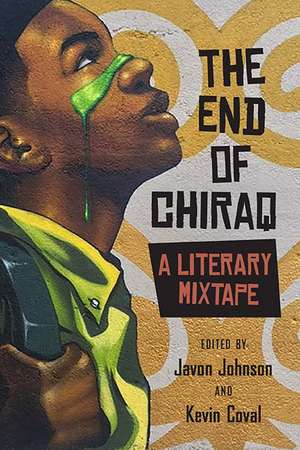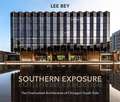The End of Chiraq: A Literary Mixtape: Second to None: Chicago Stories
Editat de Javon Johnson, Kevin Coval Contribuţii de Andrew Barber, Mariame Kaba, Malcolm London, Aneko Jackson, Nile Lansana, Demetrius Amparan, Page May, Fatimah Asghar, Jacqui Germain, Patricia Frazier, Tim Henderson, Kara Jackson, Alfonzo Kahlil, Krista Franklin, Naudia Williams, Jamila Woods, Sara Geiger, Sammy Ortega, Melinda Hernandez, Jose Olivarez, Natalie Richardson, Michael Cuaresma, Claire DeRosa, Raymesha Henry, Anton Charles Sanders, Breanna Bonslater, Jake Krez, Tara C. Mahadevan, Marwin Williams, Nate Marshall, Marvin Tate, KZ, Jalen Kobayashi, E'mon Lauren, Leah Love, Miguel Aguilar, Matthew Wilbourn, Idris Goodwin, Sarah McKee, Grace Jones, Jahnari Pruitt, Sarah Macareag, Yana Kunichoff, Haki R. Madhubuti, Gellila Asmamaw, Regina Berg, Britteney Kaprien Limba Engleză Paperback – 15 mai 2018
The End of Chiraq: A Literary Mixtape is a collection of poems, rap lyrics, short stories, essays, interviews, and artwork about Chicago, the city that came to be known as "Chiraq" ("Chicago" + "Iraq"), and the people who live in its vibrant and occasionally violent neighborhoods. Tuned to the work of Chicago’s youth, especially the emerging artists and activists surrounding Young Chicago Authors, this literary mixtape unpacks the meanings of “Chiraq” as both a vexed term and a space of possibility.
"Chiraq" has come to connote the violence—interpersonal and structural—that many Chicago youth regularly experience. But the contributors to The End of Chiraq show that Chicago is much more than Chiraq. Instead, they demonstrate how young people are thinking and mobilizing, engaged in a process of creating a new and safer world for themselves, their communities, and their city.
In true mixtape fashion, the book is an exercise in "low end theory" that does not just include so-called underground and marginal voices, but foregrounds them. Edited by award-winning poets, writers, and teachers Javon Johnson and Kevin Coval, The End of Chiraq addresses head-on the troublesome relationship between Chicago and Chiraq and envisions a future in which both might be transformed.
"Chiraq" has come to connote the violence—interpersonal and structural—that many Chicago youth regularly experience. But the contributors to The End of Chiraq show that Chicago is much more than Chiraq. Instead, they demonstrate how young people are thinking and mobilizing, engaged in a process of creating a new and safer world for themselves, their communities, and their city.
In true mixtape fashion, the book is an exercise in "low end theory" that does not just include so-called underground and marginal voices, but foregrounds them. Edited by award-winning poets, writers, and teachers Javon Johnson and Kevin Coval, The End of Chiraq addresses head-on the troublesome relationship between Chicago and Chiraq and envisions a future in which both might be transformed.
Preț: 113.01 lei
Nou
Puncte Express: 170
Preț estimativ în valută:
21.62€ • 22.64$ • 17.89£
21.62€ • 22.64$ • 17.89£
Carte indisponibilă temporar
Doresc să fiu notificat când acest titlu va fi disponibil:
Se trimite...
Preluare comenzi: 021 569.72.76
Specificații
ISBN-13: 9780810137189
ISBN-10: 0810137186
Pagini: 192
Dimensiuni: 152 x 229 x 18 mm
Greutate: 0.4 kg
Editura: Northwestern University Press
Colecția Northwestern University Press
Seria Second to None: Chicago Stories
ISBN-10: 0810137186
Pagini: 192
Dimensiuni: 152 x 229 x 18 mm
Greutate: 0.4 kg
Editura: Northwestern University Press
Colecția Northwestern University Press
Seria Second to None: Chicago Stories
Notă biografică
JAVON JOHNSON is an assistant professor of African American Studies at the University of Nevada, Las Vegas, and the director of African American and African diaspora studies. He is the author of Killing Poetry: Blackness and the Making of Slam and Spoken Word Communities (2017) and is an award-winning spoken word poet who has appeared on HBO, BET, and TVOne.
KEVIN COVAL is the founder of Louder Than a Bomb: The Chicago Youth Poetry Festival and artistic director of Young Chicago Authors. He is the coeditor of The BreakBeat Poets: New American Poetry in the Age of Hip-Hop (2015); author of A People’s History of Chicago, Schtick, L-vis Lives!,and Slingshots (A Hip-Hop Poetica); and author (with Idris Goodwin) of This Is Modern Art.
KEVIN COVAL is the founder of Louder Than a Bomb: The Chicago Youth Poetry Festival and artistic director of Young Chicago Authors. He is the coeditor of The BreakBeat Poets: New American Poetry in the Age of Hip-Hop (2015); author of A People’s History of Chicago, Schtick, L-vis Lives!,and Slingshots (A Hip-Hop Poetica); and author (with Idris Goodwin) of This Is Modern Art.
Recenzii
"This is no ordinary anthology. It’s a multigenre compilation, curated by Johnson, a professor of African American studies, and poet Coval (A People’s History of Chicago, 2017), cofounder of Chicago’s Louder Than a Bomb youth poetry festival, and it reflects the editors’ kaleidoscopic approach to literary work in one of the most diverse—and one of the most segregated—cities in the U.S. By turns academic and artistic, the collection includes interviews with community activists (like Uptown’s Elephant Rebellion), essays on Black Lives Matter and against Spike Lee’s Chi-Raq, and an artists’ round-table discussion on Afrofuturism. But at its heart are poems, produced primarily through Young Chicago Authors, and they are some of the most fiery, fiercely intelligent, wickedly funny verses brought together in one place." —Booklist
"Because this book focuses on the lived experiences of Black and Brown Chicagoans, it draws on the voices, literary cues, and artist expressions that are part of their lives. As a Black Chicagoan, I was thrilled to see the rhythms and use of Chicago slang (tha’ go and Chiraq) used in this book. It captures a unique voice, which readers (especially Chicago readers) will find compelling." —Rashad Shabazz, Associate Professor, Social Sciences at Arizona State University
"The End of Chiraq is a necessary and impassioned recovery of a set of histories, images, and a soul of Chicago that is often rendered absent in traditional demographic studies. This collection is hip-hop, once again, finding ways to give voice and power to young people." —Anthony S. Blacksher, Associate Publisher, San Diego Poetry Annual
"Because this book focuses on the lived experiences of Black and Brown Chicagoans, it draws on the voices, literary cues, and artist expressions that are part of their lives. As a Black Chicagoan, I was thrilled to see the rhythms and use of Chicago slang (tha’ go and Chiraq) used in this book. It captures a unique voice, which readers (especially Chicago readers) will find compelling." —Rashad Shabazz, Associate Professor, Social Sciences at Arizona State University
"The End of Chiraq is a necessary and impassioned recovery of a set of histories, images, and a soul of Chicago that is often rendered absent in traditional demographic studies. This collection is hip-hop, once again, finding ways to give voice and power to young people." —Anthony S. Blacksher, Associate Publisher, San Diego Poetry Annual
"How do you reclaim what is holy from a bullet riddled name? Who has the right to hold a city in their mouth? The End of Chiraq is a salve for Chicago from those who live, love, and thrive against the flat narrative of this great city. These poets, scholars, and lyricists transport the reader to Chicago summer juke parties, family barbecues, and raise the joy that refuses to die in the face of political neglect and social violence. Unflinching and unmoved, The End of Chiraq stares back into the reader’s eyes, past the murder headlines, and demands respect before you call a beloved home out its name." —Amanda Johnston, author of Another Way to Say Enter and cofounder of Black Poets Speak Out
"The violence regularly experienced by young Chicagoans is harnessed here to transform the potential and richness via rhythm, slang, hip-hop, scholarship, imagination, and documentation. It’s an important book encapsulating the feelings and experiences of the black community in Chicago, a city under siege. These are stunning voices in rap, story, interviews, never put together like this before... This is a powerful encyclopedia of human progress though creativity." —Grace Cavalieiri, Washington Independent Review of Books
"The violence regularly experienced by young Chicagoans is harnessed here to transform the potential and richness via rhythm, slang, hip-hop, scholarship, imagination, and documentation. It’s an important book encapsulating the feelings and experiences of the black community in Chicago, a city under siege. These are stunning voices in rap, story, interviews, never put together like this before... This is a powerful encyclopedia of human progress though creativity." —Grace Cavalieiri, Washington Independent Review of Books
"Put this book in the hands of anyone who keeps Chicago name in their mouth, those who call it home and outsiders alike. The poems, prose, and lyrics on this mixtape are bops and ballads, love songs, diss tracks, dirges, and hymns that sing of Chicago to my outsider ear songs like the right way. Made clear here is that legendary love folks from Chicago have for their city continues to be translated into sharp criticism, impressive lyrics, and stellar poetry by emergent scribes of Chicago’s current artistic renaissance. Play this book loud! Let it bang in your classroom, blast it at the bookstore. The End of Chiraq points to a bright and urgent future for a city in the capable hands of its young people, and they would also like to remind you to watch your mouth." —Danez Smith, author of Don't Call Us Dead and [insert] boy
“I want to see unconditional love and the end of Chiraq. If you feel the same way, my one 'answer' would be to read this book.” —Cody Lee, NewPages
“I want to see unconditional love and the end of Chiraq. If you feel the same way, my one 'answer' would be to read this book.” —Cody Lee, NewPages
Descriere
An anthology of poetry, lyrics, artwork, and essays from Chicago youth that explores the origins and meanings of the name “Chiraq.”






